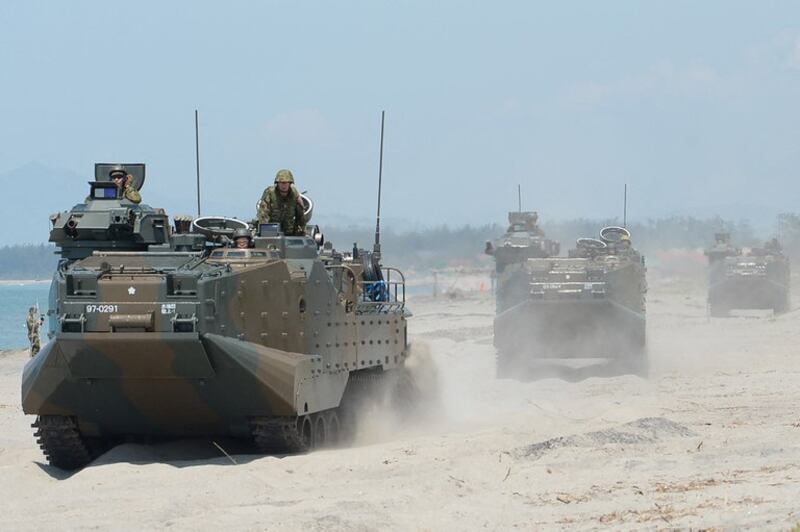Under a defense treaty newly ratified by the Philippine Senate, Japan and the Philippines can deploy troops on each other’s soil for military exercises, as the two allied nations contend with territorial challenges from China.
The Reciprocal Access Agreement (RAA), which Manila and Tokyo signed in July, allows for larger-scale joint military drills and also paves the way for military personnel to take part in security operations, such as coordinated maritime patrols.
On Monday, lawmakers in the upper house of the Philippines’ Congress unanimously approved Senate Resolution No. 1248, which endorses ratification of the treaty. It will take effect once Philippine President Ferdinand Marcos Jr. signs off on it and Japan’s legislature ratifies it.
The RAA will allow Japanese troops to be deployed to Philippine soil for the first time since Imperial Japan occupied the Philippines during World War II, although Japanese military personnel have participated as observers in exercises staged in the Southeast Asian country in recent years.
The agreement is expected to strengthen cooperation between the Armed Forces of the Philippines and the Self-Defense Forces of Japan, Sen. Juan Miguel Zubiri said.
“As the President of the Philippine-Japan Parliamentary Association, I welcome and celebrate this concurrence and I look forward to the ways in which partnerships between our Armed Forces and the Self-Defense Forces of Japan will enhance our security and defense capabilities, and especially our disaster-management efforts,” Zubiri said.
RELATED STORIES
Philippine ratification of Japan military pact uncertain in 2024: Senate leader
Philippines joins US-led allies in multilateral maneuvers in South China Sea
Philippine, Japanese warships conduct joint exercises in South China Sea
In China’s shadow, Philippines and Japan sign groundbreaking defense pact
Philippines, Japan may soon sign ‘historic’ defense pact
Under Philippine law, the country’s president has the power to ratify a treaty or international agreement but the Senate, the upper house of Congress, must first concur with ratification.
The RAA serves as a framework for Japanese security operations and training with other nations. Japan has pursued similar agreements with a handful of countries, such as the United Kingdom and Australia, but this is a first in Asia.
“For the Armed Forces of the Philippines (AFP), this agreement provides substantial benefits, particularly in enhancing training opportunities, joint exercises, and interoperability,” Philippine military spokeswoman Col. Francel Margareth Padilla said in a statement.
The partnership will help the AFP address security challenges, especially in critical areas such as the South China Sea, and further solidify its preparedness and resilience in safeguarding the country’s sovereignty, Padilla said.
“In terms of our territorial defense posture, the RAA will bolster our maritime domain awareness capabilities through technology transfers, intelligence sharing, and strengthened collaboration with Japan, a country with advanced defense systems,” she said.

The Philippines has a similar pact with the U.S., the Visiting Forces Agreement (VFA), which was signed in 1999 and sets the terms under which American military personnel can operate on Philippine soil.
Japan, unlike the Philippines, does not have territorial claims that overlap with China’s expansive ones in the South China Sea. But Tokyo has a separate dispute with Beijing over a group of uninhabited Senkaku Islands (also known as the Diaoyu Islands) in the East China Sea.
Endo Kazuya, the Japanese ambassador to Manila, expressed his appreciation to the Philippine Senate for ratifying their defense deal.
“Our countries have long stood together as strategic partners, and this milestone reaffirms our shared commitment to a peaceful, stable, and prosperous Indo-Pacific region,” Kazuya said in a statement.
With the Senate’s ratification of the treaty, China can be expected to keep a closer eye on the region, Philippine security analyst Chester Cabalza said.
“Beijing will [further] intensify its gray zone and lawfare strategies against Manila with the support of Japan-China’s strategic rivalry in the region,” said Cabalza, president of International Development and Security Cooperation, a Manila think-tank.
“It is expected that Washington under the incoming President Donald Trump administration is willing to bandwagon with Manila and Tokyo to persuade Beijing to accept rules-based norms,” he added.
China had earlier criticized the signing of the RAA and reiterated that bilateral cooperation should not “target” third parties. Beijing also reminded Tokyo of its “aggression and colonial rule” over Manila and other Southeast Asian countries during World War II.
Last week, Philippine Defense Secretary Gilberto Teodoro described the treaty as an “instrument of trust” aimed at strengthening defense relations and fostering stability in the Asia-Pacific region.
Teodoro emphasized the agreement’s role in maintaining an open, inclusive, and rules-based international order grounded in international law.
Mark Navales in Manila contributed to this report.
BenarNews is an RFA-affiliated news service.
